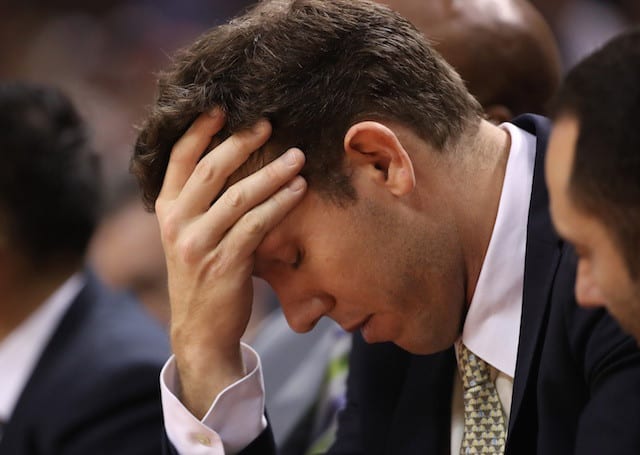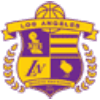With the Los Angeles Lakers mired in a dreadful stretch of poor play, bad losses, and a seemingly never-ending string of injuries, it’s not surprising that the general focus is shifting to their 2017 NBA Draft pick.
Unfortunately, that’s where things get complicated. Thanks to the disastrous Steve Nash trade in 2012, the Lakers will send their first-round pick to the Philadelphia 76ers this summer unless it lands in the top three.
As of this writing, Los Angeles has the second-worst record in the league and with it a 56 percent chance of hanging onto their pick, but it’s a close race (the third-worst Miami Heat are almost certain to make a move to increase their draft odds before the deadline) and even a game or two could drastically alter those odds.
The stakes get raised when you take into account that not one, but two first round picks are at risk this summer. The Lakers’ first rounder in 2019 is owed to the Orlando Magic, but that pick becomes the Lakers’ 2017 and 2018 second round selections if they don’t send their first to Philadelphia 76ers this season, which is something that no one thought possible back in 2012 when Dwight Howard came to Los Angeles, but here we are. With a lottery win this summer, the Lakers would undo some of the damage from the horrific Howard trade.
The bottom line is that keeping the pick this season would be incredibly beneficial for the Lakers, particularly since the new Collective Bargaining Agreement looks to stifle player movement and makes the draft far and away the best opportunity to find a much-needed superstar. The downside to keeping the pick this summer would be that their 2018 pick would go to Philadelphia unprotected, but the adding a 2019 selection to the war chest would be well worth it.
With the eighth and final playoff spot drifting into the distance and almost out of sight, the Lakers have once again entered a bizarro world where losses help more than wins.
That said, losing games, or tanking, can be an ugly, unsettling business. We have watched Philadelphia do everything they can to sink to the bottom as they jettisoned their most talented players and refused to even attempt to sign anyone who might cause them to accidentally win a game or two. Morality and sportsmanship was thrown into question as the team came under fire, and GM Sam Hinkie was eventually shown the door.
But it worked.
The end result has been the addition of young talents like Joel Embiid and Ben Simmons, plus potential trade chips in Nerlens Noel and Jahlil Okafor, role players like Dario Saric, and a mountain of draft picks still to come. The years of “Trusting the Process” suddenly look as though they will pay off, though that perception is mostly due to the impressive play of Embiid.

That’s all it takes in the NBA–one star–and so many wrongs are righted and narratives shifted.
With that being the case, should the Lakers tank? Well, it depends on how one defines the word. Most consider tanking to be players deliberately losing games, but that isn’t going to happen in the NBA, where no athlete wants to fall on their sword just so a young gun can come in and take their minutes and spotlight next season.
The more modern definition would involve simply giving young players the lion’s share of the minutes, which kills two birds with one stone because young guns tend to lose a lot of games but they also benefit greatly by learning from their mistakes. Tanking means accepting losses now while doing everything possible to ensure that wins will come in the future, which sounds an awful lot like what the Lakers are already doing.
For example, youngsters Julius Randle and Brandon Ingram are leading the team in minutes per game. Some eyebrows could be raised at D’Angelo Russell only playing 26 minutes per night, but head coach Luke Walton has mostly allowed the team’s core of the future to learn from their mistakes, certainly more than his predecessor, Byron Scott, did.
Even rookie Ivica Zubac, who spent much of the season in the D-League, has recently been moved into the rotation in place five-year veteran Thomas Robinson. In fact, Walton has been so committed to developing Zubac that he has shown no qualms about giving him more minutes than veteran starter Timofey Mozgov, which has happened twice in the last four games.
The only way for the Lakers to tank harder than they already are would be to either completely bench productive veteran players or trade them, with the most-likely candidates being Lou Williams and Nick Young (Timofey Mozgov and Luol Deng’s contracts are almost certainly too large to move). Given Walton’s recent comments about teams who blatantly try to lose incurring the wrath of the basketball gods, it seems unlikely that he would sit either of his sweet-shooting guards.

A trade seems like an excellent solutions, as it would allow the Lakers to completely push minutes to their young players without upsetting any deities and could return more assets to help the team down the road. Both Williams and Young have played arguably the best seasons of their careers (Williams has a team-high PER of 22.9) and have team-friendly contracts that appear tradable.
Parting with either (or both) would do the job of negatively impacting the Lakers’ win total this season while possibly adding future assets.
However, just because a player has value doesn’t necessarily mean that there is a team out there willing to part with an asset for them. After all, both Williams and Young fit clearly-defined roles, but how many teams out there need the bench scoring that they provide? And of those teams, how many of them feel like either of those players are the missing piece they need to get to the top? How many of those teams have an asset to give up for them?
The list dwindles quickly, and GM’s around the league are well aware of just how valuable draft picks have become, so they won’t be easy to obtain.
As fun as it is to plug in names and salaries to the Trade Machine and find a deal that returns young players and/or picks to Los Angeles, it takes two to tango and most teams simply aren’t interested in giving up future assets unless it allows them to make a serious run at a title. In a league where the Golden State Warriors and Cleveland Cavaliers exist, the list of teams that fit those parameters is certainly tiny, and possibly nonexistent.

Should the Lakers decide to go the trade route (something Mitch Kupchak didn’t sound too keen on), it’s likely that they won’t find anyone willing to meet their asking price. Historically, the Lakers have declined to make deals when they don’t receive the value they are looking for, so it would appear that the odds of a deal being made are slim at best.
In other words, right now we are watching the Lakers tank at the highest level that decency will allow.
Despite the uproar about tanking and the importance of losses, the reality is that the Lakers simply can’t do much more than they already are. They won’t lose games on purpose, so the losses have to come naturally while the young players develop. In this way, they can still hold their heads high and avoid a smiting from a vengeful set of basketball gods.
The fun, exciting wins from November may be long gone, but right now the Lakers are putting themselves in the best position to find success in the future. It isn’t pretty, but we can hope that it is, at least, effective.





